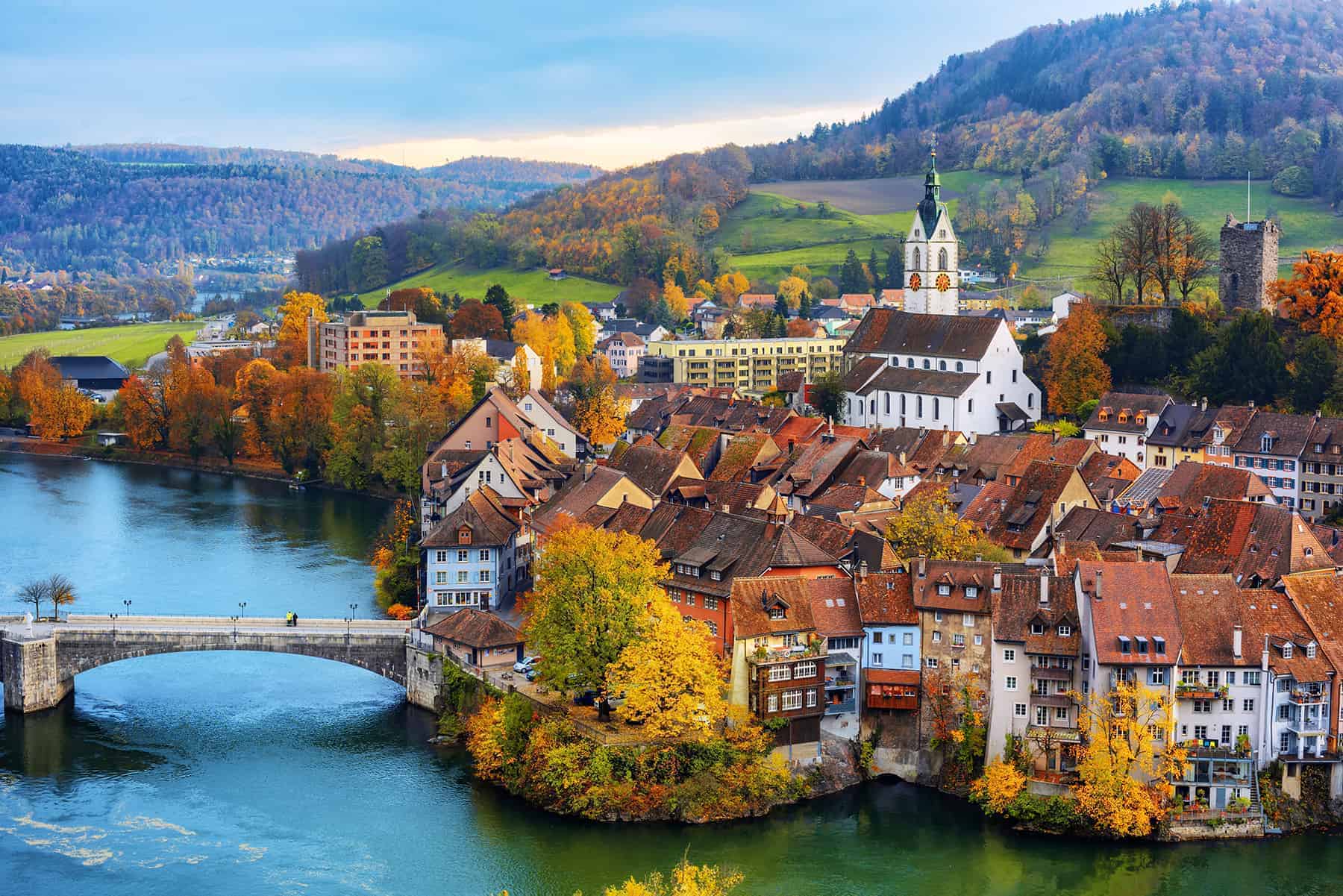Switzerland's natural beauty and high quality of life attract many people each year. However, moving to Switzerland can be difficult because of all the paperwork, forms, and rules that you need to fill out and follow.
We’d hate to see you get overwhelmed or give up on your dreams, so the following guide will help you get organized and hopefully ease your process of moving to Switzerland.
In this guide:
- Visas and residency: applications and requirements.
- Housing: sorting out accommodation.
- Registering with the local authorities.
- Healthcare: insurance and registering with a doctor.
- Opening a bank account.
- Enrolling your children in school.
- Driving in Switzerland.
- Things to know before you move.
Secure Peace of Mind with Best-Value International Health Coverage
International Citizens Insurance provide free, no-obligation quotes from the leading international health insurance providers with plans tailored to meet your needs. Trusted by thousands of expats worldwide.
Step 1: Apply for a long-stay visa
Swiss immigration policies differ for different nationalities. Moving here is the easiest for EU/EFTA (European Free Trade Association) and Schengen citizens. If you are one of them, you do not need a visa to enter the country.
The same applies to several other countries. You can check whether you need a visa to enter Switzerland on the government site.
Regardless of whether you need a visa or not, you will have to apply for a residency permit if you decide to live here for more than three months.
Non-EU nationals
Moving there as a non-EU/EFTA/Schengen citizen is much more complicated. You have to apply for a D-type visa (long-stay visa) before traveling to the country. There is an annual cap on how many non-EU nationals are allowed to immigrate to Switzerland.
Here's a list of documents required to apply for a D visa:
- A completed Switzerland Visa application form
- Two passport photos
- A valid passport
- Health insurance
- A cover letter that explains the reason for traveling to Switzerland
- Flight itinerary or proof of booked flight tickets
- Proof of accommodation in Switzerland
- Proof of civil status
- Proof that you have enough funds to support yourself during your stay
- Proof of your employment status: employed, self-employed, student, retired.
Depending on which type of D visa you are applying for, extra documents might be required.
Remember to provide the original document and three copies of it, translated into English or one of Switzerland’s national languages (French, Italian, German, or Romansh).
D-visa types
- A work visa for those who have a Swiss work contract
- A student visa if you have a certificate of enrollment in a university
- A family reunion visa for anyone who is joining a family member already living in the country.
- An investment visa for those who can guarantee a minimum contribution of 250 000CHF in annual taxes.
- A retirement visa for foreign retirees who have enough funds to be able to support themselves throughout their retirement and can show ties to the country.
To apply for any of these visas, you have to go to the Swiss consulate or embassy in your country. The visa only allows you to enter the country, and you are expected to apply for a permit upon arrival.

Step 2: Sort out your accommodations
To even be allowed to register with the local authorities when you arrive, you have to provide a valid address, so I highly recommend sorting out accommodation before moving. I also advise anybody who is apartment hunting to not only look online but use property agents, as that would improve your chances.
Moving house and all the paperwork that comes with it is a real hassle. So, I personally recommend opting for a long-term lease right away.
On top of identification, a landlord will probably ask you for work-related documents, marital status, number of children, pets, proof of no ongoing legal judgment, etc.
Connecting utilities
Rent in Switzerland also covers utilities in most cases. Most rental homes come with utilities already connected since a previous tenant or owner would have set them up.
However, setting them up isn’t too complicated since the companies that provide the utilities aren’t fully liberalized. This means that you most likely won’t have a choice when it comes to the decision of what supplier you go with, as you’ll basically just have to sign with your local one.
Importing your household goods
Thankfully, the Swiss government allows household goods to be imported to the country duty-free since buying new furniture here can be very pricey. However, there are some conditions.
All items have to have been purchased and used for at least six months before your moval date. Make sure you can prove it. Otherwise, customs will most likely make you pay a very hefty fee if you don’t provide this documentation.
Your moving company should be able to help you with the customs forms and documentation.
Keep in mind that the Swiss border police are known for being very strict and pedantic.
Overall, I would say that even though shipping furniture, appliances, etc., can be expensive and a bit of a hassle, cost-wise, it is worth it, especially if you are moving from a country that is quite close by.
For more information on your international removals options, read our Essential Guide To Cost-Effective International Removals.
Step 3: Register with the authorities on arrival
In order to obtain a residency permit, you have to register with the authorities on arrival. This is done at your local municipality within two weeks of entering the country and before your first working day.
Be sure to check the municipality's website for all the required documents and to confirm their opening hours because some of them, especially the smaller ones, are only open 2 or 3 days a week.
If your registration was successful, you should expect your residency permit within 2 to 4 weeks.
Sorting out residence permits
Depending on how long you are planning to stay, you will be issued an L or a B residence permit.
An L permit is issued for a maximum of a 2-year stay and has to be renewed at the halfway mark. This permit is tied to your job offer. If you change your job, your permit renewal might be refused.
A B permit is for longer temporary residence or the first step in moving here permanently. You can apply for a C permit after ten years of living in Switzerland with a B permit if you are a non-EU/EFTA citizen and after five years if you are an EU/EFTA citizen.
A C permit allows you to reside in the country indefinitely and also allows you to apply for Swiss citizenship if you want.
Step 4: Sort out your healthcare
Signing up for health insurance is mandatory within the first three months of your arrival.
Free healthcare does not exist here, so you will have to sign with a private insurer.
The cost of the insurance is calculated based on where you live, so you could end up paying quite a lot, even if you don’t earn so much. Opting for a basic plan also only covers standard services, so dentistry and specialized treatments will most likely cost you extra.
Expats very often prefer to opt for international health insurance. To make sure you get the best value for money, compare international health insurance options from various providers to find the best deal.
Registering with a doctor
Registering with a doctor is not a complicated process, as it often goes hand in hand with your health insurance. You will be able to choose which practitioner you want, but the options might be a bit limited if you have a cheaper plan.

I highly recommend using the Swiss Medical Association’s website to find a doctor.
Medical practitioners in Switzerland also have a reputation for being very professional, and most of them do speak English (especially in the big cities). Remember to also bring your Swiss health insurance card with you when you go for your appointment.
Step 5: Open a bank account
Switzerland is pretty famous all over the world for its banks, so it’s no surprise that there is a great selection to choose from, with the two main ones being Credit Swiss and UBS.
Opening an account is pretty easy and straightforward. You can either go to a branch office and open your account there or create an account online, which can be a bit more complicated.
The whole process can take anywhere from a week to a month and a half (including the time to deliver the bank cards).
To be able to open an account, you will need an ID, a valid address with proof of residence, and proof of employment or legitimacy of the funds that you are looking to deposit.
Step 6: Enroll your children in school
Switzerland has great public and private schools.
Most children in Switzerland attend a public school that is free as taxes finance it. You most likely won’t be able to choose which one your child goes to as it depends on your home address.
Each canton’s enrollment procedure is a bit different, so I recommend checking out your canton’s education department for more info.
Another thing to keep in mind is that in secondary schools, children are allocated to various streams based on their academic abilities. Your child's language proficiency in one of the local languages will be among the main factors.
Switzerland also has some very prestigious private schools. If you are worried that your child's local language abilities are not up to scratch, a private school can be a great solution. It does come with very big tuition fees, though. The enrollment process varies from school to school.
If you are considering an international school, be aware that many of them are often oversubscribed and have long waiting lists. It's best to contact various international schools before you move to find out whether you can secure a place for your child.
Step 7: Sort out your driving license and your vehicle
If you plan on staying in Switzerland for less than a year, you can use your home country’s license without a problem, but it has to be in English, French, German, or Italian. If it’s not, then you also have to carry an International driver's license with you.
If you are staying here for longer, you will have to apply for a Swiss driver's license. Licenses from the EEA can be exchanged very easily. If you are a non-EEA national, you will have to take a practical and sometimes even a theory test in order to acquire a Swiss driving license.
Fun fact: a Swiss driving license never expires, so once you’ve got it, you’ve got it!
Importing a car
Importing your car to Switzerland can be done duty-free when you move, as long as you can prove that you bought it at least six months before. You can also use your foreign license plate for up to a year, but after that, you have to register it in Switzerland, which usually costs around 300 francs.
Buying a car in Switzerland
Buying a car is also an option, and the process is fairly simple. Anyone who lives there and has a driver's license can buy one without any trouble. All you need to do after your purchase is made is to register the car at your local road traffic office.
Car insurance
Being insured to at least a third-party level is also required when driving in Switzerland. This costs around 350 francs a year. You can also opt for a variety of other types of car insurance if you wish.
Vehicle tax
Vehicle tax in Switzerland varies between 100 to 800 francs a year, depending on the canton you live in and your car type.
Motor vehicle inspection
Be sure also to always have your motor vehicle inspections up to date. All vehicles have to go through an MFK four years after the initial purchase and then seven years after it. After seven years of age, they have to be tested every two years.
Things to know about Switzerland
Let's speak about the key features of living in Switzerland that you need to know before you move so that you can plan ahead accordingly. These include the country's quirks, the cost of living, taxes, and other essential details.

Switzerland cantons and languages
Switzerland is divided into 26 cantons, which are semi-autonomous states within the country. The cantons have their own governments, laws, and jurisdictions.
As a result, different cantons have different taxes, rules, education policies, etc.
Switzerland is a multilingual country. The four official languages of Switzerland are German, French, Italian, and Romansh.
The cantons of Bern, Fribourg, Valais, Neuchâtel, Geneva, Vaud, and Jura are bilingual, with German and French being the predominant languages. If you are planning to move to one of these cantons, you will see that locals are fluent in both languages, and you can often hear a mix of the two in daily conversations and official communication.
There are cantons where multiple languages are spoken. For example, in Ticino, the main language spoken is Italian, but some areas near the Swiss-German border also have a significant German-speaking population. Similarly, in Graubünden, the canton with the highest linguistic diversity, German, Romansh, and Italian are spoken in different parts of the region.
The cost of living in Switzerland
Here are two facts for you to consider:
- Switzerland is one of the most expensive countries in the world.
- The average Swiss city is significantly cheaper than Zurich or Geneva.
So, if you are planning to rent, here are the average rental costs in various cities across the country:
| City / Town | 1-Bed Apt | 3-Bed Apt |
|---|---|---|
| Zurich | $2,000 | $4,500 |
| Geneva | $1,950 | $4,200 |
| Basel | $1,700 | $3,700 |
| Lausanne | $1,600 | $3,500 |
| Bern | $1,500 | $3,200 |
| Lucerne | $1,400 | $3,000 |
| St. Gallen | $1,300 | $2,700 |
| Lugano | $1,200 | $2,500 |
If you are planning to enjoy life in a less popular location (less crowded and touristy), you can find more reasonable prices.
In Jura, for example, the average monthly rent ranges from approximately $980 to $1,420.
Another affordable area is Aargau, located near Zurich. Here, you can find apartments with average monthly rents ranging from around $1,200 to $1,650. Aargau's proximity to Zurich makes it an attractive option if you are looking for more affordable housing while still being within reach of the city.
Valais, a mountainous region known for its stunning landscapes, also offers reasonably priced rental options. The average rental prices in Valais range from roughly $990 to $1,650 per month. You can enjoy the beauty of the Swiss Alps while keeping housing costs relatively affordable.
Freiburg, in the west of Switzerland, is another area where rental prices are relatively cheap compared to some urban centers. The average monthly rent in Freiburg ranges from around $880 to $1,320.
Lastly, Neuchâtel, a charming city located by Lake Neuchâtel, provides affordable rental opportunities with average prices ranging from approximately $990 to $1,650 per month.
However, to be honest, no one is moving to Switzerland for affordability. It's the lifestyle and the quality of life that attract people to this country. To choose the right place, head to our guide to the best places to live in Switzerland and see what lifestyle options you have across the country.
Taxes in Switzerland
Taxes in Switzerland are paid to the federal government and to the canton and municipality that you live in. This means that the percentage of your income that will go to taxes depends on where you live.
For example, some of the highest tax rates are in Canton Vaud, and some of the lowest are in Canton Zug.
The whole system is pretty complicated, especially if you are a newcomer to the country, so asking for professional advice is always a good idea.
Final thoughts on moving to Switzerland
Switzerland is a great but complicated place to move to, and you will probably need some time to adjust to the lifestyle and figure out how everything operates.
There are plenty of expats already living in Switzeròand, especially in the big cities, so finding friends, even if you don’t necessarily speak the language, won’t be too difficult.
You might find helpful:
- The Pros And Cons Of Living In Switzerland - discover the positive and negative sides of Switzerland before you make a firm commitment to the country.
- 16 Best Places To Live In Switzerland As An Expat – a detailed review of the best locations for families, professional expats, ski and nature enthusiasts.
- Haven't found what you were looking for? Contact us or comment below with your question and we'll do our best to help.
Secure Peace of Mind with Best-Value International Health Coverage
International Citizens Insurance provide free, no-obligation quotes from the leading international health insurance providers with plans tailored to meet your needs. Trusted by thousands of expats worldwide.




